LoudMe AI Music Generator: Free AI Composes Music
In the ever-changing landscape of music production, Artificial Intelligence (AI) is playing a significant role in making music creation more accessible. Today, we'll dive into the world of the LoudMe AI music generator, a tool that lets users craft royalty-free music by simply entering text prompts. This introduction will explore the exciting opportunities and potential impacts this technology offers, particularly for content creators and musicians.
Key Points
- LoudMe AI is a free tool that generates royalty-free songs from text prompts.
- The use of AI in music generation is a hot topic, sparking debates about artistic originality and the livelihoods of musicians.
- LoudMe AI offers both a music generator and a sound effect generator.
- While AI music generation provides speed and convenience, there are ongoing concerns about artistic quality and copyright issues.
- This tool can be used for creating background music for videos and as a creative aid for songwriters facing blocks.
- Reproducing AI-generated music manually by re-recording vocals and instruments can add a personal touch and artistic expression.
Understanding AI Music Generation
What is LoudMe AI Music Generator?
LoudMe AI is a cutting-edge online platform that revolutionizes music creation and sound design. It's an AI music generator that allows users to create original musical compositions by simply typing in text prompts. You don't need traditional instruments or deep musical knowledge; just describe the music you want, and the AI does the rest, crafting a song that aligns with your vision.

Under the hood, LoudMe AI uses sophisticated algorithms and machine learning models trained on extensive musical datasets. This allows the AI to understand and replicate patterns in melody, harmony, rhythm, and style, creating pieces that feel both original and tailored to your creative needs.
What makes LoudMe AI stand out is its user-friendliness and accessibility. Whether you're a seasoned musician or a complete beginner, this platform makes music creation more democratic and accessible. With just an internet connection and a creative spark, you're ready to go. This approach could shake up traditional music production, offering a cost-effective way for independent creators to produce high-quality music.
The Rise of AI in Music: Beyond LoudMe AI
LoudMe AI is part of a larger trend where AI is becoming increasingly integral to the music industry. Other platforms like Suno AI and Udio are making waves by allowing users to create full songs from text prompts, transforming how music is conceived and produced.

Even established companies like Eleven Labs, known for AI voice-over services, are exploring AI music generation. This convergence suggests that AI is not just a niche tool but a core component of modern music technology.
However, the integration of AI into music production isn't without controversy. From copyright issues to ethical debates about AI's role in creativity, the discussion is ongoing. As AI music generators become more advanced, they can mimic the styles of famous artists, raising concerns about artistic integrity and intellectual property rights. Balancing AI's innovative potential with the need to protect human artists' rights is a challenge.
The AI Music Controversy: Ethical and Artistic Considerations
Ethical Implications of AI in Music Composition
The use of AI in music production brings up several ethical questions that need careful consideration. For one, there's the issue of artistic originality and authorship. When an AI creates music, is it truly original, or just a remix of patterns it's learned? This raises complex questions about who owns and can copyright AI-generated music.
Another major concern is the impact on human musicians' livelihoods. If AI can produce music quickly and cheaply, it might displace human artists, particularly those who rely on creating music for commercial purposes. This could reshape the music industry and potentially diminish the value of human-created art.
Transparency and disclosure are also ethical considerations. Should AI-generated music be clearly labeled so listeners know it's not from a human artist? This transparency is crucial for informed consumer choices and ensuring that human artists' contributions aren't overshadowed by AI.
These ethical considerations highlight the need for ongoing dialogue and the development of guidelines to govern AI's use in music, balancing innovation with the rights of human artists.
Artistic Expression vs. Algorithmic Output
The heart of the AI music debate lies in the tension between artistic expression and algorithmic output. Music is often seen as a deeply personal and emotional form of expression, reflecting an artist's experiences and creativity. When AI generates music, it raises questions about whether these compositions can capture the same emotional depth and artistic intent.
Supporters of AI music argue that these tools can enhance human creativity, offering new ways to explore and experiment. AI can help musicians overcome creative blocks, generate fresh ideas, and push the boundaries of musical innovation, acting as a collaborator rather than a replacement.
However, critics argue that AI-generated music often lacks the emotional nuance and depth that comes from human experience. While AI can replicate the structure and style of various genres, it may struggle to convey the passion, vulnerability, and authenticity that listeners connect with in human-created music.
The future might involve a hybrid approach, where AI tools work alongside human creativity to produce music that combines algorithmic precision with emotional depth, allowing artists to leverage AI while maintaining their unique voice and artistic vision.
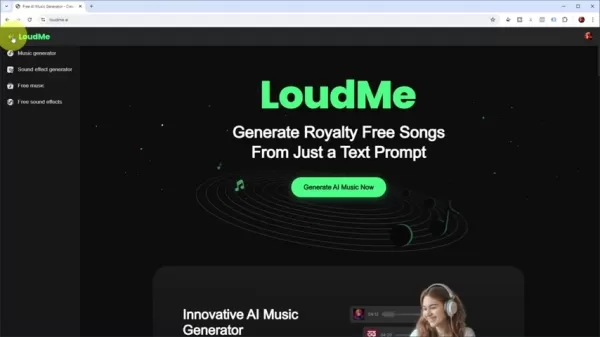
Getting Started with LoudMe AI
Generating Sound Effects with LoudMe AI
To create a sound effect with LoudMe AI, simply enter a description like 'sound of a steam train in the background'. The AI is trained to interpret a wide range of requests, from realistic environmental sounds to abstract and stylized soundscapes.

After submitting your description, the AI quickly generates several custom tracks based on your text prompt. You can review these tracks, select the ones that fit your needs, and download them for your projects.
LoudMe AI also offers advanced features to further customize your sound effects. You can adjust parameters like prompt adherence, which controls how closely the AI follows your original text prompt, and the duration of the sound effect. These options give you precise control over the final output, ensuring it matches your creative vision.
LoudMe AI Pricing Structure
Current Free Access
As of now, LoudMe AI is free to use, giving you access to all its features, including the music and sound effect generators, without any fees. This makes it an excellent choice for those wanting to explore AI music creation without financial risk.
However, this free access might not last forever. Many AI platforms start with free access to attract users and gather data but may introduce subscription plans later to sustain operations. It's wise to take advantage of the free access while it's available, as the pricing structure could change.
Keep an eye on LoudMe AI's official website for the latest pricing and subscription information to stay informed and make the best decisions for your music production needs.
Analyzing LoudMe AI: Weighing the Pros and Cons
Pros
- Free and accessible: LoudMe AI makes music creation available to anyone with an internet connection.
- Speed and efficiency: AI can generate music and sound effects quickly, speeding up the production process.
- Creative assistance: AI helps overcome creative blocks by generating unique musical ideas and combinations.
- Royalty-free: Music generated by LoudMe AI can be used for commercial purposes without royalty payments.
- Versatility: The platform offers both music and sound effect generation capabilities.
Cons
- Artistic originality: AI-generated music may lack the emotional depth and artistic intent of human-created compositions.
- Copyright concerns: Questions remain about ownership and copyright of AI-generated music.
- Impact on musicians: AI could displace human musicians, especially those who rely on creating music for commercial purposes.
- Quality concerns: The quality of AI-generated music may vary and may not always meet professional standards.
Exploring LoudMe AI Core Features
AI Music Generator and Sound Effect Tools
LoudMe AI offers a dual-functionality platform, providing both a music generator and a sound effect generator. The music generator creates complete musical pieces from text prompts, allowing users to produce original songs in various genres. The sound effect generator, on the other hand, lets you craft custom soundscapes, from realistic environmental sounds to stylized effects.
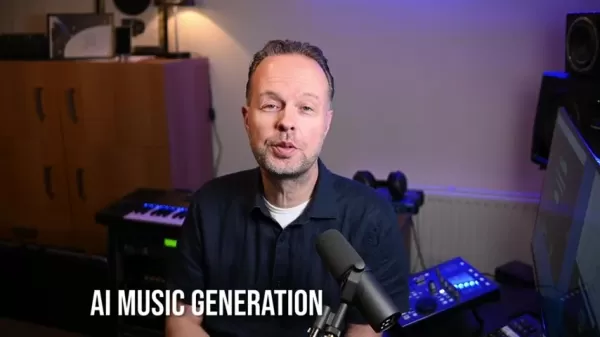
The platform also includes a library of royalty-free music and sound effects, meaning you can use the generated content in your projects without worrying about copyright issues or royalty payments. This is a significant advantage for content creators, filmmakers, and game developers needing high-quality audio assets.
LoudMe AI's user-friendly interface is designed to be intuitive and accessible, even for those new to AI music generation. The text prompt system makes it easy to express your creative ideas, and the advanced customization options give you fine-grained control over the final output.
Unlocking the Potential: Use Cases for LoudMe AI
Applications of AI in Music Production and Content Creation
LoudMe AI has a wide range of potential applications, making it a valuable tool for various creative endeavors. One common use is creating background music for videos. Content creators can use LoudMe AI to generate original, royalty-free tracks that perfectly complement their video content, enhancing the viewing experience and avoiding copyright issues.
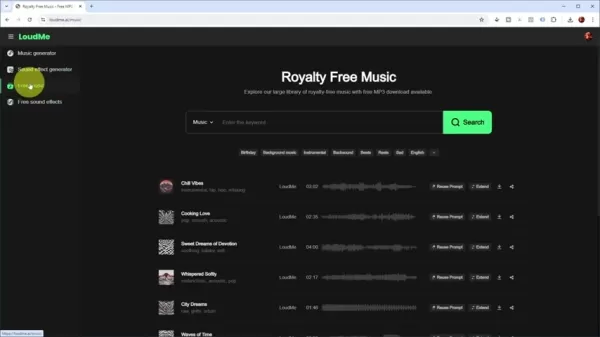
LoudMe AI can also assist with creative blocks in songwriting. When artists find themselves stuck for ideas, they can use the AI to generate new musical concepts, melodies, and harmonies. This can serve as a starting point for further development, helping artists break through creative barriers and explore new musical directions.
Additionally, LoudMe AI is useful for prototyping musical ideas. Musicians can quickly generate a rough version of a song to test out arrangements, instrumentation, and overall structure. This allows them to refine their ideas before investing significant time and resources into full production.
Game developers can use LoudMe AI to create custom soundscapes and effects for their games, enhancing the immersive experience for players. Filmmakers can also benefit from the platform by generating original scores that perfectly match the tone and mood of their films.
Frequently Asked Questions
Is LoudMe AI really free?
As of now, LoudMe AI offers free access to all its features. However, this may change in the future, so it's best to check their website for the most up-to-date pricing information.
Can I use the music generated by LoudMe AI for commercial purposes?
Yes, LoudMe AI generates royalty-free music, which means you can use it in your commercial projects without paying royalties or worrying about copyright issues.
Does LoudMe AI generate sound effects?
Yes, in addition to the music generator, LoudMe AI also provides a sound effect generator.
Related article
 AI-Powered Cover Letters: Expert Guide for Journal Submissions
In today's competitive academic publishing environment, crafting an effective cover letter can make the crucial difference in your manuscript's acceptance. Discover how AI-powered tools like ChatGPT can streamline this essential task, helping you cre
AI-Powered Cover Letters: Expert Guide for Journal Submissions
In today's competitive academic publishing environment, crafting an effective cover letter can make the crucial difference in your manuscript's acceptance. Discover how AI-powered tools like ChatGPT can streamline this essential task, helping you cre
 US to Sanction Foreign Officials Over Social Media Regulations
US Takes Stand Against Global Digital Content Regulations
The State Department issued a sharp diplomatic rebuke this week targeting European digital governance policies, signaling escalating tensions over control of online platforms. Secretary Marco
US to Sanction Foreign Officials Over Social Media Regulations
US Takes Stand Against Global Digital Content Regulations
The State Department issued a sharp diplomatic rebuke this week targeting European digital governance policies, signaling escalating tensions over control of online platforms. Secretary Marco
 Ultimate Guide to AI-Powered YouTube Video Summarizers
In our information-rich digital landscape, AI-powered YouTube video summarizers have become indispensable for efficient content consumption. This in-depth guide explores how to build a sophisticated summarization tool using cutting-edge NLP technolog
Comments (6)
0/200
Ultimate Guide to AI-Powered YouTube Video Summarizers
In our information-rich digital landscape, AI-powered YouTube video summarizers have become indispensable for efficient content consumption. This in-depth guide explores how to build a sophisticated summarization tool using cutting-edge NLP technolog
Comments (6)
0/200
![AnthonyScott]() AnthonyScott
AnthonyScott
 August 27, 2025 at 11:04:59 PM EDT
August 27, 2025 at 11:04:59 PM EDT
This AI music generator sounds like a game-changer! Just type a vibe, and boom, instant royalty-free tunes? I’m curious how it stacks up against human composers—could it spark a new wave of bedroom producers? 🎵


 0
0
![CarlGarcia]() CarlGarcia
CarlGarcia
 April 25, 2025 at 2:18:46 PM EDT
April 25, 2025 at 2:18:46 PM EDT
O LoudMe AI Music Generator é bem legal! Só digitar o que você quer e pronto, você tem uma música. Não é perfeito sempre, mas para uma ferramenta gratuita, é impressionante. Usei para músicas de fundo nos meus vídeos e funciona bem. Poderia ter mais variedade, mas vale a pena experimentar! 🎵


 0
0
![EricRoberts]() EricRoberts
EricRoberts
 April 25, 2025 at 2:43:57 AM EDT
April 25, 2025 at 2:43:57 AM EDT
LoudMe AI Music Generator 정말 멋지네요! 텍스트만 입력하면 음악이 나오다니, 신기해요. 다만, 좀 더 다양한 스타일이 있으면 좋겠어요. 그래도 무료로 이 정도면 만족해요! 한번 써보세요! 🎵


 0
0
![JohnGarcia]() JohnGarcia
JohnGarcia
 April 24, 2025 at 2:57:31 PM EDT
April 24, 2025 at 2:57:31 PM EDT
¡El LoudMe AI Music Generator es bastante genial! Solo tienes que escribir lo que quieres y ¡bum!, tienes una pista. No siempre es preciso, pero para una herramienta gratuita, es impresionante. Lo he usado para música de fondo en mis vídeos y funciona bien. Podría tener más variedad, pero ¡pruébalo! 🎵


 0
0
![NicholasClark]() NicholasClark
NicholasClark
 April 24, 2025 at 2:50:13 PM EDT
April 24, 2025 at 2:50:13 PM EDT
LoudMe AI Music Generatorは便利ですね!テキストを入力するだけで音楽が作れるなんて、すごいです。ただ、もっと多様なジャンルが欲しいですね。でも、無料でこれだけのクオリティなら文句なしです!使ってみてください!🎵


 0
0
![JonathanJackson]() JonathanJackson
JonathanJackson
 April 24, 2025 at 1:09:40 PM EDT
April 24, 2025 at 1:09:40 PM EDT
LoudMe AI Music Generator is pretty cool! Just type in what you want and boom, you've got a track. It's not always spot-on, but for a free tool, it's impressive. I've used it for some background music in my vids, and it works well enough. Could use a bit more variety though. Give it a try! 🎵


 0
0
In the ever-changing landscape of music production, Artificial Intelligence (AI) is playing a significant role in making music creation more accessible. Today, we'll dive into the world of the LoudMe AI music generator, a tool that lets users craft royalty-free music by simply entering text prompts. This introduction will explore the exciting opportunities and potential impacts this technology offers, particularly for content creators and musicians.
Key Points
- LoudMe AI is a free tool that generates royalty-free songs from text prompts.
- The use of AI in music generation is a hot topic, sparking debates about artistic originality and the livelihoods of musicians.
- LoudMe AI offers both a music generator and a sound effect generator.
- While AI music generation provides speed and convenience, there are ongoing concerns about artistic quality and copyright issues.
- This tool can be used for creating background music for videos and as a creative aid for songwriters facing blocks.
- Reproducing AI-generated music manually by re-recording vocals and instruments can add a personal touch and artistic expression.
Understanding AI Music Generation
What is LoudMe AI Music Generator?
LoudMe AI is a cutting-edge online platform that revolutionizes music creation and sound design. It's an AI music generator that allows users to create original musical compositions by simply typing in text prompts. You don't need traditional instruments or deep musical knowledge; just describe the music you want, and the AI does the rest, crafting a song that aligns with your vision.

Under the hood, LoudMe AI uses sophisticated algorithms and machine learning models trained on extensive musical datasets. This allows the AI to understand and replicate patterns in melody, harmony, rhythm, and style, creating pieces that feel both original and tailored to your creative needs.
What makes LoudMe AI stand out is its user-friendliness and accessibility. Whether you're a seasoned musician or a complete beginner, this platform makes music creation more democratic and accessible. With just an internet connection and a creative spark, you're ready to go. This approach could shake up traditional music production, offering a cost-effective way for independent creators to produce high-quality music.
The Rise of AI in Music: Beyond LoudMe AI
LoudMe AI is part of a larger trend where AI is becoming increasingly integral to the music industry. Other platforms like Suno AI and Udio are making waves by allowing users to create full songs from text prompts, transforming how music is conceived and produced.

Even established companies like Eleven Labs, known for AI voice-over services, are exploring AI music generation. This convergence suggests that AI is not just a niche tool but a core component of modern music technology.
However, the integration of AI into music production isn't without controversy. From copyright issues to ethical debates about AI's role in creativity, the discussion is ongoing. As AI music generators become more advanced, they can mimic the styles of famous artists, raising concerns about artistic integrity and intellectual property rights. Balancing AI's innovative potential with the need to protect human artists' rights is a challenge.
The AI Music Controversy: Ethical and Artistic Considerations
Ethical Implications of AI in Music Composition
The use of AI in music production brings up several ethical questions that need careful consideration. For one, there's the issue of artistic originality and authorship. When an AI creates music, is it truly original, or just a remix of patterns it's learned? This raises complex questions about who owns and can copyright AI-generated music.
Another major concern is the impact on human musicians' livelihoods. If AI can produce music quickly and cheaply, it might displace human artists, particularly those who rely on creating music for commercial purposes. This could reshape the music industry and potentially diminish the value of human-created art.
Transparency and disclosure are also ethical considerations. Should AI-generated music be clearly labeled so listeners know it's not from a human artist? This transparency is crucial for informed consumer choices and ensuring that human artists' contributions aren't overshadowed by AI.
These ethical considerations highlight the need for ongoing dialogue and the development of guidelines to govern AI's use in music, balancing innovation with the rights of human artists.
Artistic Expression vs. Algorithmic Output
The heart of the AI music debate lies in the tension between artistic expression and algorithmic output. Music is often seen as a deeply personal and emotional form of expression, reflecting an artist's experiences and creativity. When AI generates music, it raises questions about whether these compositions can capture the same emotional depth and artistic intent.
Supporters of AI music argue that these tools can enhance human creativity, offering new ways to explore and experiment. AI can help musicians overcome creative blocks, generate fresh ideas, and push the boundaries of musical innovation, acting as a collaborator rather than a replacement.
However, critics argue that AI-generated music often lacks the emotional nuance and depth that comes from human experience. While AI can replicate the structure and style of various genres, it may struggle to convey the passion, vulnerability, and authenticity that listeners connect with in human-created music.
The future might involve a hybrid approach, where AI tools work alongside human creativity to produce music that combines algorithmic precision with emotional depth, allowing artists to leverage AI while maintaining their unique voice and artistic vision.

Getting Started with LoudMe AI
Generating Sound Effects with LoudMe AI
To create a sound effect with LoudMe AI, simply enter a description like 'sound of a steam train in the background'. The AI is trained to interpret a wide range of requests, from realistic environmental sounds to abstract and stylized soundscapes.

After submitting your description, the AI quickly generates several custom tracks based on your text prompt. You can review these tracks, select the ones that fit your needs, and download them for your projects.
LoudMe AI also offers advanced features to further customize your sound effects. You can adjust parameters like prompt adherence, which controls how closely the AI follows your original text prompt, and the duration of the sound effect. These options give you precise control over the final output, ensuring it matches your creative vision.
LoudMe AI Pricing Structure
Current Free Access
As of now, LoudMe AI is free to use, giving you access to all its features, including the music and sound effect generators, without any fees. This makes it an excellent choice for those wanting to explore AI music creation without financial risk.
However, this free access might not last forever. Many AI platforms start with free access to attract users and gather data but may introduce subscription plans later to sustain operations. It's wise to take advantage of the free access while it's available, as the pricing structure could change.
Keep an eye on LoudMe AI's official website for the latest pricing and subscription information to stay informed and make the best decisions for your music production needs.
Analyzing LoudMe AI: Weighing the Pros and Cons
Pros
- Free and accessible: LoudMe AI makes music creation available to anyone with an internet connection.
- Speed and efficiency: AI can generate music and sound effects quickly, speeding up the production process.
- Creative assistance: AI helps overcome creative blocks by generating unique musical ideas and combinations.
- Royalty-free: Music generated by LoudMe AI can be used for commercial purposes without royalty payments.
- Versatility: The platform offers both music and sound effect generation capabilities.
Cons
- Artistic originality: AI-generated music may lack the emotional depth and artistic intent of human-created compositions.
- Copyright concerns: Questions remain about ownership and copyright of AI-generated music.
- Impact on musicians: AI could displace human musicians, especially those who rely on creating music for commercial purposes.
- Quality concerns: The quality of AI-generated music may vary and may not always meet professional standards.
Exploring LoudMe AI Core Features
AI Music Generator and Sound Effect Tools
LoudMe AI offers a dual-functionality platform, providing both a music generator and a sound effect generator. The music generator creates complete musical pieces from text prompts, allowing users to produce original songs in various genres. The sound effect generator, on the other hand, lets you craft custom soundscapes, from realistic environmental sounds to stylized effects.

The platform also includes a library of royalty-free music and sound effects, meaning you can use the generated content in your projects without worrying about copyright issues or royalty payments. This is a significant advantage for content creators, filmmakers, and game developers needing high-quality audio assets.
LoudMe AI's user-friendly interface is designed to be intuitive and accessible, even for those new to AI music generation. The text prompt system makes it easy to express your creative ideas, and the advanced customization options give you fine-grained control over the final output.
Unlocking the Potential: Use Cases for LoudMe AI
Applications of AI in Music Production and Content Creation
LoudMe AI has a wide range of potential applications, making it a valuable tool for various creative endeavors. One common use is creating background music for videos. Content creators can use LoudMe AI to generate original, royalty-free tracks that perfectly complement their video content, enhancing the viewing experience and avoiding copyright issues.

LoudMe AI can also assist with creative blocks in songwriting. When artists find themselves stuck for ideas, they can use the AI to generate new musical concepts, melodies, and harmonies. This can serve as a starting point for further development, helping artists break through creative barriers and explore new musical directions.
Additionally, LoudMe AI is useful for prototyping musical ideas. Musicians can quickly generate a rough version of a song to test out arrangements, instrumentation, and overall structure. This allows them to refine their ideas before investing significant time and resources into full production.
Game developers can use LoudMe AI to create custom soundscapes and effects for their games, enhancing the immersive experience for players. Filmmakers can also benefit from the platform by generating original scores that perfectly match the tone and mood of their films.
Frequently Asked Questions
Is LoudMe AI really free?
As of now, LoudMe AI offers free access to all its features. However, this may change in the future, so it's best to check their website for the most up-to-date pricing information.
Can I use the music generated by LoudMe AI for commercial purposes?
Yes, LoudMe AI generates royalty-free music, which means you can use it in your commercial projects without paying royalties or worrying about copyright issues.
Does LoudMe AI generate sound effects?
Yes, in addition to the music generator, LoudMe AI also provides a sound effect generator.
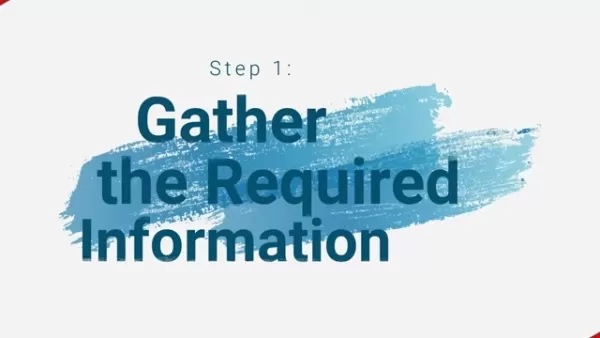 AI-Powered Cover Letters: Expert Guide for Journal Submissions
In today's competitive academic publishing environment, crafting an effective cover letter can make the crucial difference in your manuscript's acceptance. Discover how AI-powered tools like ChatGPT can streamline this essential task, helping you cre
AI-Powered Cover Letters: Expert Guide for Journal Submissions
In today's competitive academic publishing environment, crafting an effective cover letter can make the crucial difference in your manuscript's acceptance. Discover how AI-powered tools like ChatGPT can streamline this essential task, helping you cre
 US to Sanction Foreign Officials Over Social Media Regulations
US Takes Stand Against Global Digital Content Regulations
The State Department issued a sharp diplomatic rebuke this week targeting European digital governance policies, signaling escalating tensions over control of online platforms. Secretary Marco
US to Sanction Foreign Officials Over Social Media Regulations
US Takes Stand Against Global Digital Content Regulations
The State Department issued a sharp diplomatic rebuke this week targeting European digital governance policies, signaling escalating tensions over control of online platforms. Secretary Marco
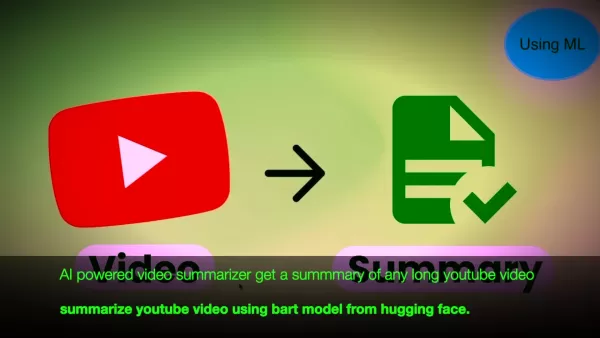 Ultimate Guide to AI-Powered YouTube Video Summarizers
In our information-rich digital landscape, AI-powered YouTube video summarizers have become indispensable for efficient content consumption. This in-depth guide explores how to build a sophisticated summarization tool using cutting-edge NLP technolog
Ultimate Guide to AI-Powered YouTube Video Summarizers
In our information-rich digital landscape, AI-powered YouTube video summarizers have become indispensable for efficient content consumption. This in-depth guide explores how to build a sophisticated summarization tool using cutting-edge NLP technolog
 August 27, 2025 at 11:04:59 PM EDT
August 27, 2025 at 11:04:59 PM EDT
This AI music generator sounds like a game-changer! Just type a vibe, and boom, instant royalty-free tunes? I’m curious how it stacks up against human composers—could it spark a new wave of bedroom producers? 🎵


 0
0
 April 25, 2025 at 2:18:46 PM EDT
April 25, 2025 at 2:18:46 PM EDT
O LoudMe AI Music Generator é bem legal! Só digitar o que você quer e pronto, você tem uma música. Não é perfeito sempre, mas para uma ferramenta gratuita, é impressionante. Usei para músicas de fundo nos meus vídeos e funciona bem. Poderia ter mais variedade, mas vale a pena experimentar! 🎵


 0
0
 April 25, 2025 at 2:43:57 AM EDT
April 25, 2025 at 2:43:57 AM EDT
LoudMe AI Music Generator 정말 멋지네요! 텍스트만 입력하면 음악이 나오다니, 신기해요. 다만, 좀 더 다양한 스타일이 있으면 좋겠어요. 그래도 무료로 이 정도면 만족해요! 한번 써보세요! 🎵


 0
0
 April 24, 2025 at 2:57:31 PM EDT
April 24, 2025 at 2:57:31 PM EDT
¡El LoudMe AI Music Generator es bastante genial! Solo tienes que escribir lo que quieres y ¡bum!, tienes una pista. No siempre es preciso, pero para una herramienta gratuita, es impresionante. Lo he usado para música de fondo en mis vídeos y funciona bien. Podría tener más variedad, pero ¡pruébalo! 🎵


 0
0
 April 24, 2025 at 2:50:13 PM EDT
April 24, 2025 at 2:50:13 PM EDT
LoudMe AI Music Generatorは便利ですね!テキストを入力するだけで音楽が作れるなんて、すごいです。ただ、もっと多様なジャンルが欲しいですね。でも、無料でこれだけのクオリティなら文句なしです!使ってみてください!🎵


 0
0
 April 24, 2025 at 1:09:40 PM EDT
April 24, 2025 at 1:09:40 PM EDT
LoudMe AI Music Generator is pretty cool! Just type in what you want and boom, you've got a track. It's not always spot-on, but for a free tool, it's impressive. I've used it for some background music in my vids, and it works well enough. Could use a bit more variety though. Give it a try! 🎵


 0
0





























